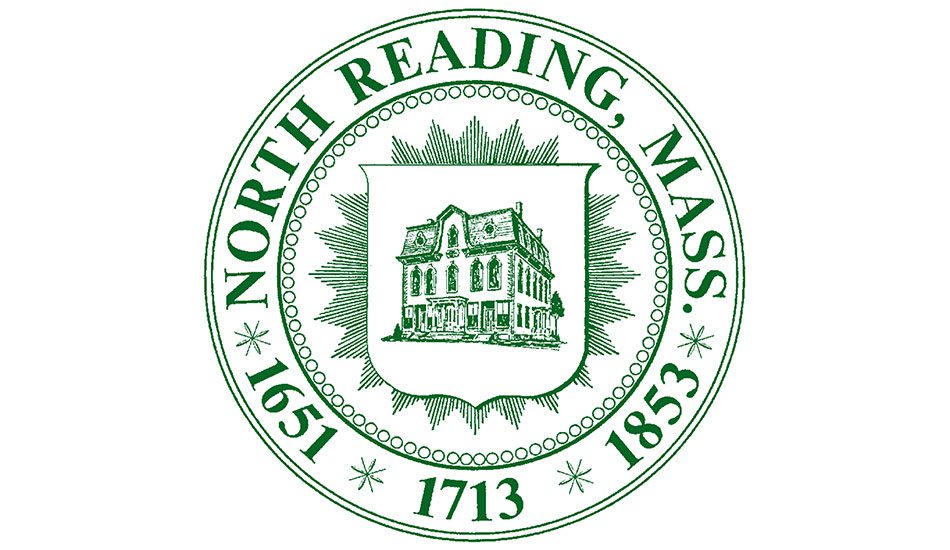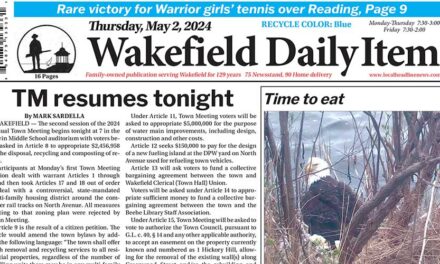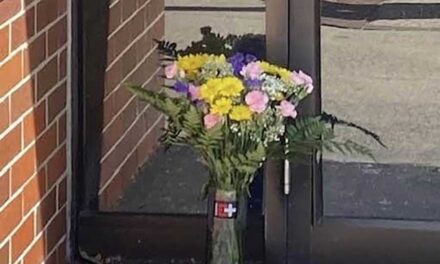By MAUREEN DOHERTY
NORTH READING — Sausage-making is not for the faint of heart; neither is crafting a municipal budget, especially in tough economic times.
For nearly 20 years, the town’s financial wizards have managed to present a balanced operating budget to the Town Meeting voters each spring without the need to request an override of Proposition 2 ½. This is the state law passed in the early 1980s that limits the combined increase in property taxes on all properties in town to not more than 2 ½ percent per year.
For Fiscal Year 2025 and beyond, town officials representing both the school and municipal sides of the ledger are bracing for the fact that an override will be necessary to maintain level services, mainly due to the impact of rising prices on the town’s fixed costs and a slowdown in new growth. Why is new growth important? It enables a town’s tax base to increase through the tax revenue generated by new construction and renovations to existing properties that increase their value.
The only other way a town can increase property taxes above the 2 ½ percent levy is through a debt exclusion override vote that is limited to the number of years the town needs to repay a bond that funds very large capital projects, such as was done about 10 years ago to cover the costs of the Middle School and High School construction projects.
Last Wednesday night, April 10, the town’s Financial Planning Team held a joint public meeting attended by members of the Select Board, School Committee, Finance Committee and Capital Improvement Planning Committee and members of the public. The Financial Planning Team, according to Town Administrator Michael Gilleberto, is not a public body but rather a collaboration of these boards along with administrators representing both the school and municipal departments, including Finance Director Laurianne Galvin, Superintendent of Schools Dr. Patrick Daly and Assistant Superintendent of Finance and Operations Michael Connelly. In short, they are the chief sausage-makers.
But Gilleberto and Daly also stressed in a joint message during the presentation that their role “as administrators and as professional staff for elected officials is to share with you the history, the projections and their impacts, and the options available to the town. Ultimately, the decisions to be made are in the hands of Town Meeting and voters. The direction we proceed in including the options and the recommendations made to Town Meeting and the voters is guided by the elected and appointed officials in the room this evening. We are here to assist and to guide, but under state Conflict of Interest and Campaign Finance laws we are limited, to some extent, in our ability to recommend and/or advocate.”
$10M recommendation is not cast in stone
The FPT is recommending a total Proposition 2 ½ override of $10M to be phased in over a three-year period, but the members stressed that this is not a binding number and it would be “subject to Town Meeting approval each year to provide funding of projected increases in years two and three.” Gilleberto also stressed that without an operating override the town will be incurring debt for both the Chestnut Street and Burroughs Road culvert projects and a new ladder truck that could only be funded through a debt exclusion override. Concurrently, the town will pursue any bridge grants or other sources of funding to help offset the culvert costs.
Any override vote would require a two-step process. A vote of Town Meeting on June 10 and town wide vote at the ballot box that would need to take place prior to the end of the current fiscal year, which is June 30. Since the state requires the town to notify the Town Clerk a minimum of 35 days in advance of an override vote, the Select Board will need to take a vote on this matter sooner rather than later since state law also requires the town to have a balanced budget in place by July 1, which is the start of the new fiscal year. Notifying the Town Clerk of the need to arrange for an override vote is a formality, not a guarantee that it will be needed. And since there is always a chance that Town Meeting voters would reject an override vote either at Town Meeting or at the ballot box, a second budget that does not require an override will also be included in the Town Meeting warrant that voters would be asked to take action on.
Prior articles in the Transcript have discussed the school department budget, which is slated to be voted on Monday, April 22, therefore, this article will focus on the town budget. The Select Board is also meeting on Monday, April 22 but is not slated to vote on its budget recommendations until May 6.
The current FY24 municipal budget was voted in at $19,361,656. The revenue available in the projected FY25 budget, by conservative estimates, is $20,001,248. For the town to maintain a level-services budget in FY25, a budget of $20,246,436 is needed. This spring, the town’s department heads made budget requests totaling $21,402,361. The shortfall for a level-services budget is $245,188. But Gilleberto is also recommending the town fund as a crucial need four additional firefighters with benefits at a cost of $341,902. He advised the Select Board and those present that the fire chief has been asking for these new positions for the past four or five years due to increases in call volumes.
To balance out this shortfall, Gilleberto trimmed the FY25 department head budget requests by $215,188 such as eliminating a grant manager ($80,000), DPW business manager ($45,000) and the Public Safety Director position ($30,000) while funding other requests through the use of Free Cash, such as a generator for the Damon Tavern ($8,000), a radar gun for the police department and a forcible entry simulator for the Fire Dept. ($9,000). He then made an additional reduction of $341,714 with several reductions that will impact the future generation of Free Cash, including: reducing police and fire overtime, veterans benefits, fill-in inspectors for code enforcement, town building maintenance, fuel, IT capital, fire training and education/training and professional services for the Board of Health. He emphasized that balancing the budget in this manner will have a snowball effect on the FY26 budget when such turn backs will not be available to stabilize the budget to fund one-time purchases the town needs, further impacting the delivery of services to the townspeople.
So much data has been generated by this process that the town officials have added a special page to the home page of the town website (www.northreadingma.gov) entitled “FY 2025 Budget Central.” All of the budget documents, including specific departmental requests, have been uploaded to this site.
Budget Webinar April 24
Using the FY 2025 Budget Central page will also be the simplest way for townspeople to access the direct link that will be posted on this page for a virtual and interactive webinar on the budget slated for next Wednesday night, April 24 at 8 p.m. All members of the public are invited to attend and ask questions.
In-person Budget Workshop May 9
Additionally, an in-person Q&A will be held Thursday, May 9 at 7:30 p.m. in the Distance Learning Lab at NRHS.





